Impact Stories from Empowering Women and Girls Policy Area
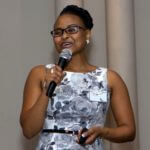
Emerging Leader shares perspective in guest blog post
Fellow(s): Tozama Qwebani-Ogunleye
Country: South Africa
Cohort: 2018
Policy Area(s): Empowering Women and Girls, Professional Growth
In our new TechWomen blog series, Emerging Leader Voices, Emerging Leaders are invited to share their perspectives and experiences with the TechWomen Community. Dr. Tozama Qwebani-Ogunleye, 2018 Emerging Leader from South Africa, begins the series with her guest post, “Embracing challenges, taking opportunities.” Tozama, a lifelong student of math and science, reflects on her upbringing, the challenges she faced and how her path led her to TechWomen. “My experience taught me that failures could be overcome with hard work,” she says.
During her professional mentorship, Tozama hopes to build a global professional network and drive positive change internationally. “Becoming a TechWomen fellow is such a celebration,” she writes. “It has the potential to put my name, my family name, my university and my town on the map of potential future leaders in science.” Currently, Tozama is Project Director at Vaal University of Technology.
Report Date...: 8/27/2018
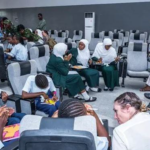
Fellow shares delegation trip experience in blog post
Fellow(s): Binta Moustapha
Country: Nigeria
Cohort: 2014
Policy Area(s): Empowering Women and Girls, Professional Growth, Youth Engagement
In a blog written for Science Communication Hub Nigeria, 2014 fellow Binta Moustapha shares her experience during the TechWomen delegation trip to Nigeria, where she faciliatated a hands-on STEM day for girls aged 13-18 in Abuja:
“The beauty of the workshop and others hosted during this visit was an amazing opportunity for some of these delegates – the Tech Ambassadors – to get the first-hand experience of Nigeria while providing meaningful transfer of knowledge skills and experience with both the participants and the TechWomen fellows… We should continually promote such exchanges, especially the acquisition of digital skills and making science fun to learn.”
Binta’s post, “TechPlomacy: a new frontier for Nigeria,” can be found here.
Report Date...: 8/20/2018
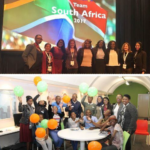
Team South Africa shares action plan news in guest blog post
Fellow(s): Emily Pather and Team South Africa
Country: South Africa
Cohort: 2017
Policy Area(s): Empowering Women and Girls, Youth Engagement
2017 fellow of South Africa Emily Pather authored a guest post for the TechWomen blog on behalf of KasiMaths, a seed grant-winning action plan project. Team South Africa conceived of KasiMaths through the desire to make a difference in the lives of underprivileged students: “Kasi” refers to township areas that house historically socially and economically disadvantaged people. Inspired by the program’s mission statement – Math is Fun, Math is Essential, Math is Everywhere – KasiMaths helps these students develop mathematical skills and gain confidence in their abilities.
This June, KasiMaths launched their first hub in partnership with the U.S Embassy in South Africa and the Rosa Park Library in Soweto. “We have 16 eager students and five passionate volunteers,” says Emily. Moving forward, team South Africa hopes that their community-based approach and low-cost delivery model will allow KasiMaths to be scalable, replicable and continue to have meaningful impact in their community.
Report Date...: 8/20/2018
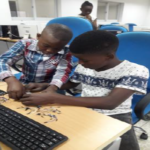
Fellow launches STEM training program for youth
Fellow(s): Beatrice Sonfack
Country: Cameroon
Cohort: 2016
Policy Area(s): Empowering Women and Girls, Professional Growth, Youth Engagement
2016 fellow of Cameroon Beatrice Sonfack recently launched INNOVTECH, an after-school training program for local youth. The program begins with STEM-based teaching and training and culminates in a week of hands-on activities and experiments in a local makerspace. At the end of INNOVTECH, students present their projects to a panel of judges, competing for the opportunity to receive mentoring and guidance on how to bring their project to market. The program is part of Wentech, an initiative Beatrice launched that encourages young girls to become involved in STEM through education and training.
Beatrice, an electrical engineer and educator, was hosted by Folsom Labs while in the TechWomen program.
Read More »Report Date...: 8/13/2018

Fellow awarded grants for recycled furniture initiative
Fellow(s): Olamide (Mide) Ayeni
Country: Nigeria
Cohort: 2017
Policy Area(s): Empowering Women and Girls, Professional Growth
Fellow Mide Ayeni (2017) of Nigeria was recently awarded two grants to further her work: a Ford Foundation grant and a U.S. Department of State federal assistance award. Mide is the founder of Pearl Recycling, a social enterprise that transforms raw and recycled materials such as tires, bottles and plastics into furniture and art.
Mide’s Ford Foundation grant will be used to train 100 young women in Lagos in furniture making. With her award from the U.S. government, she will equip 20 Nigerian public schools with 400 ergonomic classroom chairs made from recycled materials and will train 800 students on waste reuse in Lagos.
Through her trainings, Mide hopes to reduce unemployment, re-purpose waste and reinvigorate the local economy.
Read More »Report Date...: 8/6/2018
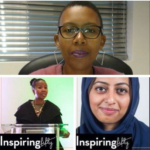
Fellows selected among top 50 inspiring women in South Africa
Fellow(s): Fanelwa Ajayi, Zimkhita Buwa, Ridhwana Khan
Country: South Africa
Cohort: 2013, 2017
Policy Area(s): Empowering Women and Girls, Professional Growth
Fellows Fanelwa Ajayi (2013), Zimkhita Buwa (2017) and Ridhwana Khan (2017) of South Africa have been selected for this year’s Inspiring 50 South Africa list. Established by CoCreateSA, the Inspiring 50 list honors South African women who are making a meaningful impact in STEM fields.
Fanelwa is the founder of AmaQawe Ngemfundo, a program that provides interactive STEM-based education to children in rural and township schools. Zimkhita, an advocate for girls seeking careers in technology, is the chief operating officer at BriteHouse. Ridhwana is the co-founder and a software developer at Zero One, as well as an active leader of KasiMaths, which started as a TechWomen seed-grant winning action plan project providing math tutoring to students in under-resourced communities and has continued to expand.
This year, CoCreateSA received nearly 300 nominations for the Inspiring 50 list. Winners were chosen by a panel of female leaders in STEM throughout South Africa.
Report Date...: 7/30/2018
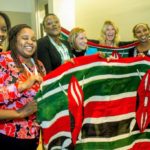
Team Kenya shares action plan updates in guest blog post
Fellow(s): Ruth Kaveke, Janet Leparteleg, Charity Wanjiku, Chao Mbogo and Topy Muga
Country: Kenya
Cohort: 2017
Policy Area(s): Empowering Women and Girls, Youth Engagement
2017 fellows of Kenya Ruth Kaveke, Janet Leparteleg, Charity Wanjiku, Chao Mbogo and Topy Muga wrote a guest post for the TechWomen blog, providing an update on their action plan project. A lack of toilet facilities represents a major cause of sanitation-related illnesses across the world and has led many schools in Kenya to shut down. In response to this, Team Kenya’s initiative, Project Digniti, aims to build new toilets and design a sanitation curriculum in rural schools through partnerships with existing sanitation providers.
The team selected Nengerpus Primary School, located 350 kilometers from Nairobi, for the pilot program after meeting with the school’s principal and chair of the board in June. The school has 123 students but only one toilet for girls. Project Digniti will install two additional girls’ toilets with the help of local builders. Once new facilities are installed, the team will train school staff and students about best sanitation practices through a comprehensive curriculum. The team is also partnering with companies to provide cleaning products for the toilets.
Report Date...: 7/16/2018
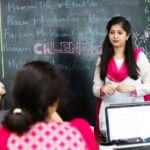
Pakistani fellow launches mentoring initiative for orphans
Fellow(s): Mehak Jamal
Country: Pakistan
Cohort: 2017
Policy Area(s): Education Diplomacy/Mentoring, Empowering Women and Girls, Professional Growth, Youth Engagement
2017 fellow Mehak Jamal of Pakistan recently launched a social initiative called Ibtida, meaning “beginning” in Urdu, for local women to support other young women. Ibtida will train educated but economically inactive women from financially marginalized communities as mentors for middle school girls in under-resourced schools. For mentors, Ibtida develops a higher sense of self, thus supporting them to a become more engaged in their community; for the young girls, “it’s the beginning of a journey of self-exploration.”
Once trained, mentors are placed in underserved schools, where they will implement activity-based programming for girls to develop skills that better prepare them to enter the workforce. The first cycle of Ibtida will begin this September with 20 mentors and 60 eighth grade girls from Lahore, beginning with young orphans, who are among the most vulnerable in their society. In the second phase, the program will expand to include refugees and internally displaced persons.
Mehak hopes that the program will be enriching for both mentors and mentees and will help address the low rate of women in the workforce in Pakistan by empowering participants with marketable skills and training. Her goal is that by 2020, Ibtida will support 600 women, 1,200+ young girls and 30 schools.
Report Date...: 7/16/2018
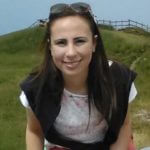
Fellow wins AEIF award for initiative to train women on entrepreneurship and software development
Fellow(s): Shatha Jayyousi
Country: Jordan
Cohort: 2013
Policy Area(s): Education Diplomacy/Mentoring, Empowering Women and Girls, Youth Engagement
2013 fellow of Jordan Shatha Jayyousi was among the 2018 Alumni Engagement Innovation Fund (AEIF) award winners for an initiative that will train women and girls, including about 50 migrants, in Amman and Athens. The cross-border project, a collaboration with alumni of the International Visitors Leadership Program and the Fulbright Student Program, will utilize a mobile learning curriculum to provide business entrepreneurship and software development training to help participants launch their own businesses. The program represents an effort to address high unemployment rates in both Jordan and Greece, as well as the gender gap in STEM and digital skills. Shatha credits her participation in TechWomen for connecting her to the vast and supportive Department of State alumni network.
AEIF awards support alumni initiatives that promote shared values and innovative solutions to global challenges. Out of more than 1,300 applications submitted this year, Shatha’s project is one of just 70 to be selected for a grant, and is funded under the AEIF theme of Empowering Women and Girls.
Report Date...: 7/9/2018
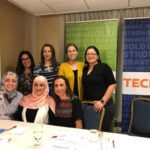
Fellows travel with TechGirls to U.S. and lead panel discussion
Fellow(s): Reham Nasser, Nisreen Deeb, Shatha Jayyousi, Amel Ghouila and Hania Gati
Country: Algeria, Egypt, Jordan, Lebanon, Tunisia
Cohort: 2011, 2013, 2014
Policy Area(s): Education Diplomacy/Mentoring, Empowering Women and Girls, Youth Engagement
Fellows Reham Nasser (2011) of Egypt, Nisreen Deeb (2013) of Lebanon, Shatha Jayyousi (2013) of Jordan, Amel Ghouila (2014) of Tunisia and Hania Gati (2011) of Algeria were selected as the inaugural group of TechWomen fellows to serve as flight chaperones for the 2018 TechGirls cohort, joining the girls in traveling from their home countries to Washington, DC. TechGirls is an ECA initiative that brings 15- to 17-year-old girls from the Middle East and North Africa (MENA) to the United States to empower and inspire them to pursue careers in STEM. TechGirls hail from the same seven countries in MENA as TechWomen participants.
After escorting TechGirls participants to the U.S., the fellows joined a panel discussion – also livestreamed on Facebook – to kick off TechGirls’s U.S. programming. Panelists discussed their work and how they became interested in STEM and also shared advice for the girls. Reham encouraged them to never be afraid to ask questions. She spoke about how boldness enriched her TechWomen experience tremendously, enabling her to learn as much as she could. Fellows also shared about support groups that helped them throughout their career and as women in STEM. Said Hania, “Both of my [TechWomen] mentors gave me so much knowledge. I thought to myself, when I come back to Algeria I have to be a mentor. The more help you receive, the more you want to give.”
Report Date...: 7/9/2018

